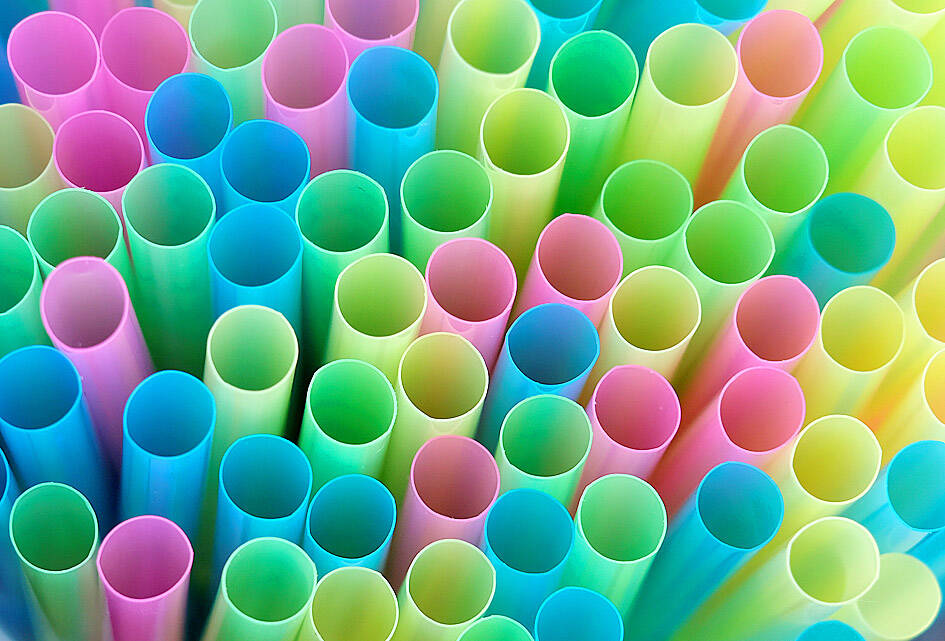Taiwan’s plastic reduction policies were formulated in line with the Global Plastic Treaty and would not follow the US government’s route, Minister of Environment Peng Chi-ming (彭啟明) said on Sunday.
Peng made the remarks in response to media queries on whether Taiwan would follow suit after US President Donald Trump signed an executive order reversing plastic straw bans.
Moving toward a plastic-free future is a global consensus, as microplastics are highly detrimental to the environment, Peng said, adding that the government would strive for the set goals.

Photo: Reuters
In 2018, the government set the goals of limiting the use of plastic bags and straws, and disposable cups and tableware by this year and completely banning their use by 2030, he said, adding that these goals would not be changed.
The goal of banning single-use plastic cups was attained ahead of schedule last year, while reaching the goals of limiting the use of other items by the end of this year remains challenging, he said.
More communication with the public is required to change consumer habits, Peng added.
Given that negotiations on the Global Plastic Treaty last year did not bear fruit, the government would follow up on its latest developments and propose a new plastic-reduction timeline that incorporates plastic-free goals by 2035, with more plastic items such as online shopping packaging to be included, he said.
In other developments, Climate Change Administration Director-General Tsai Ling-yi (蔡玲儀) last week said that Taiwan might fail its goal of reducing carbon emissions by 10 percent this year.
A public hearing on the draft of “the third phase of periodic regulatory goals for greenhouse gas emissions” was held on Friday.
The draft sets phased carbon reduction goals by 2030 for the six major sectors — energy, manufacturing, residential and commercial, transportation, agriculture, and environment — and the national carbon reduction target of cutting greenhouse gas emissions by 28 percent, plus or minus 2 percent, by 2030 compared to the 2005 baseline.
As the development of renewable energy in Taiwan is behind schedule by about a year, the amount of national carbon cut is estimated to be 7 percent to 8 percent by the end of this year, less than the set goal of 10 percent, Tsai said.
A potential turning point lies in the manufacturing sector’s fuel choices, as burning of fuels accounted for about 10 percent of domestic carbon emissions, she said.
Increasing the makeshift use of natural gas and the application of green energy would be the key to reaching the 10 percent goal, given that power demand cannot be overlooked while decreasing coal combustion — a large source of carbon emissions, she said.
Environmental groups in the public hearing expressed concern over the energy and manufacturing sectors shirking their accountability for carbon reduction, saying that the petrochemical industry should put forward concrete net zero transition and carbon reduction goals.
Tsai said that opinions from all parties were collected in the hearing and would be organized for review by agencies including the Ministry of Transportation and Communications, the Ministry of Economic Affairs, the Ministry of Agriculture and the Ministry of the Interior to step up carbon reduction efforts.
The draft would be sent to the Executive Yuan for approval, with agencies proposing their action plans in the second half of this year, she said, adding that their proposed plans are expected to take effect next year.

Taiwanese scientists have engineered plants that can capture about 50 percent more carbon dioxide and produce more than twice as many seeds as unmodified plants, a breakthrough they hope could one day help mitigate global warming and grow more food staples such as rice. If applied to major food crops, the new system could cut carbon emissions and raise yields “without additional equipment or labor costs,” Academia Sinica researcher and lead author the study Lu Kuan-jen (呂冠箴) said. Academia Sinica president James Liao (廖俊智) said that as humans emit 9.6 billion tonnes of carbon dioxide compared with the 220 billion tonnes absorbed

The Taipei Mass Rapid Transit (MRT) Wanda-Zhonghe Line is 81.7 percent complete, with public opening targeted for the end of 2027, New Taipei City Mayor Hou You-yi (侯友宜) said today. Surrounding roads are to be open to the public by the end of next year, Hou said during an inspection of construction progress. The 9.5km line, featuring nine underground stations and one depot, is expected to connect Chiang Kai-shek Memorial Hall Station to Chukuang Station in New Taipei City’s Jhonghe District (中和). All 18 tunnels for the line are complete, while the main structures of the stations and depot are mostly finished, he

Taipei is to implement widespread road closures around Taipei 101 on Friday to make way for large crowds during the Double Ten National Day celebration, the Taipei Department of Transportation said. A four-minute fireworks display is to be launched from the skyscraper, along with a performance by 500 drones flying in formation above the nearby Nanshan A21 site, starting at 10pm. Vehicle restrictions would occur in phases, they said. From 5pm to 9pm, inner lanes of Songshou Road between Taipei City Hall and Taipei 101 are to be closed, with only the outer lanes remaining open. Between 9pm and 9:40pm, the section is

China’s plan to deploy a new hypersonic ballistic missile at a Chinese People’s Liberation Army Rocket Force (PLARF) base near Taiwan likely targets US airbases and ships in the western Pacific, but it would also present new threats to Taiwan, defense experts said. The New York Times — citing a US Department of Defense report from last year on China’s military power — on Monday reported in an article titled “The missiles threatening Taiwan” that China has stockpiled 3,500 missiles, 1.5 times more than four years earlier. Although it is unclear how many of those missiles were targeting Taiwan, the newspaper reported